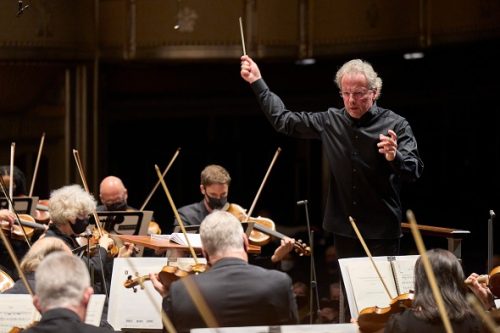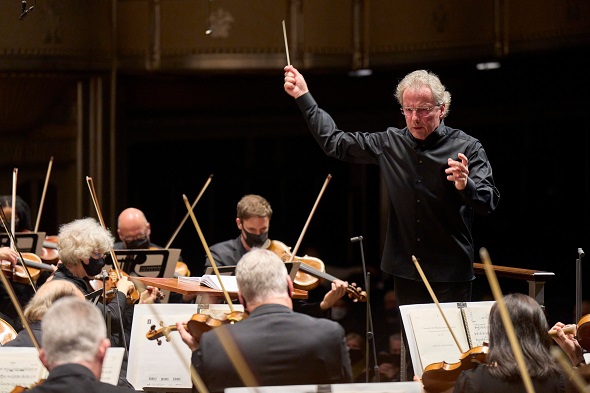 United States Mahler: Simon Keenleyside (baritone), Cleveland Orchestra / Franz Welser-Möst (conductor). Mandel Concert Hall at Severance Music Center, Cleveland, 13.10.2023. (MSJ)
United States Mahler: Simon Keenleyside (baritone), Cleveland Orchestra / Franz Welser-Möst (conductor). Mandel Concert Hall at Severance Music Center, Cleveland, 13.10.2023. (MSJ)

Mahler – ‘Frühlingsmorgen’ and ‘Hans und Grete’ from Lieder und Gesänge aus der Jugendzeit (orch. Berio); ‘Ablösung im Sommer’, ‘Revelge’, ‘Urlicht’ and ‘Rheinlegendchen’ from Des Knaben Wunderhorn (orch. Berio); Symphony No.7 in E minor
It is a valid question to ask how much personal emotion and point of view any conductor should apply to a classical work. It is likely that every composer would give a different answer to that question. Regardless, it is valuable to hear a range of approaches – the best pieces have much to reveal, and not every conductor is going to unlock each aspect of the composition.
Franz Welser-Möst, the Cleveland Orchestra’s long-time music director, may not be likely to unlock the restlessly blazing side of Mahler, but he does reveal the genuinely classic roots of this composer, one who is too often assumed to be just this side of reckless raving. In fact, Mahler was very concerned with the structure of his works and, in this performance of Mahler’s Seventh, Welser-Möst demonstrated the true strengths and weaknesses of the piece.
Its strength is the huge first movement, where Welser-Möst patiently unfolded the growing mountain of sound. Traditional performances leave the slow start of the intro behind and jump forward at the first tempo change, whereas this conductor controlled the new tempo. He showed that the growth from the intro to the main theme is a gradual, terraced increase. Many fans, used to the traditional approach, might be startled by the slow ratcheting-up, but Welser-Möst is one of the few conductors who capture exactly what Mahler wrote in his score. This terracing gave shape to the massive movement, saving a truly fast tempo for the closing pages. The numerous instrumental solos were outstanding.
The inner movements were flowing and sleek, ranging from the mystery and melancholy of the first ‘Nachtmusik’ to the amorous charm of the second. The Scherzo was played more for humor than menace (kudos to the bassoons for a plethora of rude sounds), but with nicely sprung rhythms.
I first heard Welser-Möst conduct this about twenty years ago, and he has come a long way. Back then, his approach seemed to be mainly to put his head down and rush through it. These days, he has the true measure of that beast of a first movement, letting it speak in all its wild glory without any attempt to hype it up. The inner movements have become more highly characterized and rhythmically sprung. My least favorite movement twenty years ago remains my least favorite now, as Welser-Möst perhaps takes Mahler’s ‘allegro ordinario’ a little too literally.
The movement is treacherous, and I think Mahler may have meant it as a satire of louche Viennese operetta music (with the occasional passing bit of Wagnerian bombast). In this interpretation, Mahler is good-naturedly mocking those who claimed his music was nothing more than an assemblage of influences with nothing of its own to say. The movement seems to take those kinds of influences and construct them into a nonsensical run-on sentence. To complete the joke, Mahler obsessively fills out a complex sonata-rondo structure, even though it is far too grandiose a frame for such slight material. That is the joke, I suppose, and it tends to fall flat, because we could get the message with a less-complete structure. The only performances where the joke comes within striking distance are the fastest, highest-energy renditions.
As before, Welser-Möst remains true to his approach and lets the music speak for itself at a middle-of-the-road tempo. It is all neatly done but does come across a little poker-faced. I suspect Mahler meant something more conceptually transgressive, though he lacked a sufficient way to get that across in the traditional notation of his score. Overall, though, this performance was another fine example of Welser-Möst’s restrained but often illuminating approach to a composer he was once reluctant to conduct, and it showed how this classical-centered orchestra can take flight, even in the most complex music.
Simon Keenleyside was in good voice for the selection of Mahler songs heard in the first half of the concert. The relevant one, in terms of this program, was ‘Revelge’, the grim but swaggering military march that seems recalled by moments in the first two movements of the Mahler Seventh. Keenleyside honored the musical pitches while enunciating and coloring the words, so that the narrative thread of the song was never lost.
More surprising to hear was a rare outing of ‘Urlicht’, a song heard in the Second Symphony, and this time featuring Keenleyside instead of a mezzo-soprano. While a male voice is unexpected, Keenleyside did it justice. Also delightful were a song that inspired the scherzo of the Third Symphony, ‘Ablösung im Sommer’; and the characterized dialogue of ‘Rheinlegendchen’. The performances of this disparate selection of songs were consistently pleasing.
Mark Sebastian Jordan
